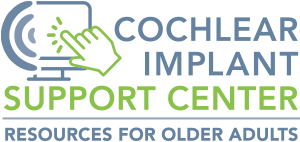
Self-Advocacy Skills
Key Takeaways
Self-advocacy is the ability to effectively communicate and negotiate one’s interests, needs, and rights.
It is important to advocate for your communication needs whether it is in a conversation with your family member or others.
Overview
Self-advocacy is the ability to effectively communicate and negotiate one’s interests, needs, and rights. You are the expert in your interests, needs, and rights when it comes to your cochlear implant. Self-advocacy varies from simple tasks (explaining your hearing loss to your doctor) to more complex tasks (filing a legal claim). Nevertheless, it is important to advocate for your communication needs whether it is in a conversation with your family member or others. The more you discuss what you need, the more comfortable and less anxious you will feel doing it.
Improving your self-advocacy skills involves multiple strategies.
1. Assess your self-advocacy skills and strengths and weaknesses. Click here to learn more information about assessing your self-advocacy skills.
2. Frequently practice your self-advocacy skills: use them in your daily life; use scripts and practice with a friend or family member; and use other exercises. Ask your friends and family to help you practice scenarios or join an in-person group, like a Hearing Loss Association of America State Chapter. Click here to learn more about Hearing Loss Association of America State Chapters.
3. Learn more information about your rights as an adult with a cochlear implant. Visit the know your rights topic to learn more.
Self-Advocacy Skills
Key Takeaways
Understanding your self-advocacy strengths and weaknesses is an important part of improving your skills.
Practicing your self-advocacy skills is also an important part of improving your skills.
Assessing Your Skills
The first step of improving your self-advocacy skills is understanding your self-advocacy strengths and weaknesses. For example, you may feel awkward telling someone you did not understand what they said, but you may feel very confident explaining your hearing loss to others. Click here to take a self-advocacy assessment to find out your strengths and weaknesses.
The next step to improving is realizing the negative consequences of not advocating for yourself. In this case, not fully participating in conversations with your friends and family can lead to feeling isolated and may even hurt your relationships with friends and family.
Once you know the outcomes you want to change, participating fully in conversations with your friends and family, practice what you want to say to your friends and family when you have trouble hearing them. You can download this handout to help you practice how to explain your hearing loss, cochlear implants, and hearing needs.
Self-Advocacy Skills
Key Takeaways
Learning more information about your rights as an adult with a cochlear implant is critical to improving your self-advocacy skills.
Know Your Rights
1. Americans with Disabilities Act (ADA) prohibits discrimination and ensures equal opportunity and access for persons with disabilities, including adults with cochlear implants. The ADA has several sections, which cover employment, public entities, private entities, and telecommunications. ADA Title II and III ensure that adults with cochlear implants cannot be denied or excluded from the benefits from any program or services by private or public entities. For example, hotels are required to have a certain number of rooms equipped with accommodations, such as phone amplifiers and text telephones. ADA Title IV ensures that TTY/TDD relay services have comparable coverage to telephones. Click here to learn more about the ADA.
2. The Rehabilitation Act prohibits discrimination by federal agencies, and programs funded by federal agencies for persons with disabilities, including employment by federal agencies and their contractors. Vocational rehabilitation agencies are required to assist persons with disabilities with finding employment. Click here to learn more about the Rehabilitation Act.
3. 21st Century Communications and Video Accessibility Act (CVAA) updates previous law to update accommodations for persons with disabilities for modern technologies. For example, programming that is closed captioned on TV must also be distributed with closed captions on the Internet. Click here to learn more about the CVAA.
4. Health care settings are places where doctors, nurses, and other health care professionals may misunderstand hearing loss and cochlear implants. You have the right to receive accurate information that you can understand about your health and treatments. Give all your doctors the necessary information to effectively communicate with you. This may be information about your cochlear implant, communication strategies, and/or accommodations you need their office to provide (e.g. written notes after appointment). Click here to view the Hearing Loss Association of American’s Guide for Effective Communication in Health Care.

